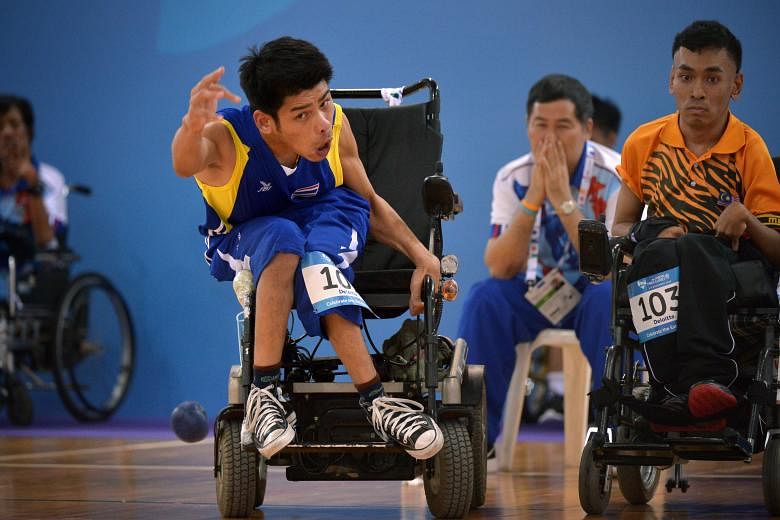When the boccia competition drew to a close yesterday, Thailand's dominance at the Asean Para Games (APG) was unquestioned, after the team swept all seven titles on offer.
As the top-ranked team in the world, boasting several top-10 players across classifications, the Thais have risen to become world-class at a game with ancient Greek origins and which has traditionally been dominated by Europeans.
Their rise began at the 2004 Paralympics in Athens, when star player Pattaya Tadtong won the country's first Paralympic medal in the sport, taking bronze in the individual BC1 event.
The 2008 Games in Beijing were fruitless for the Thais but, by the next Paralympics in London, the team had again risen to the top. Their two gold medals - Pattaya in the individual event and the team BC1/2 - put them just behind top-performing nation Brazil.
The Thais are now the world's top-ranked team and are rated one of the medal favourites at the Rio Paralympics next year.
For a nation that has just hundreds of regular players, team manager Mayuree Suphawibul told The Straits Times that the team's achievements were not by chance.
While boccia is not the top-funded para-sport - table tennis enjoys top funding, thanks to sponsors - the team still get support from the Thai government and sponsors, although Mayuree said it has not been easy to secure funding from the latter.
A sizeable chunk of the money is spent on sending the players to compete in the few competitions that are held within Asia - the ones that remain affordable to travel to. Said Mayuree: "Asian players have a disadvantage compared with the Europeans. There are a lot of competitions held within Europe and they're all quite close to one another."
This year, the Thais travelled to Dubai, Hong Kong and South Korea for competitions before coming to Singapore for the APG.
To make up for the lack of overseas competition exposure, players rely on practice. Boccia, after all, is a test of strategy and skill.
Said Mayuree: "Some of our players have been playing boccia for over 20 years. This is a sport that requires a lot of regular practice and, even in the off-season, many players practise by themselves."
Players train six hours a day in Bangkok, with just a day off every week. For the APG, the team spent four months preparing full-time.
It is not without its rewards - success at the 2012 London Games catapulted Pattaya to celebrity status and allowed him to pocket about 15 million baht (S$587,000) in earnings.
But the rise of the Thais has also put a target on their backs and spurred opponents to get better. So while the team are still eyeing success in Rio next year, head coach Kotsila Sumrit remains conservative with a target of just one gold in the team BC1/2 event.
Pattaya, 36, who has cerebral palsy, said: "I don't feel more pressure. It's all in the spirit of sport. I have discipline and responsibility, and I want to stay champion."


